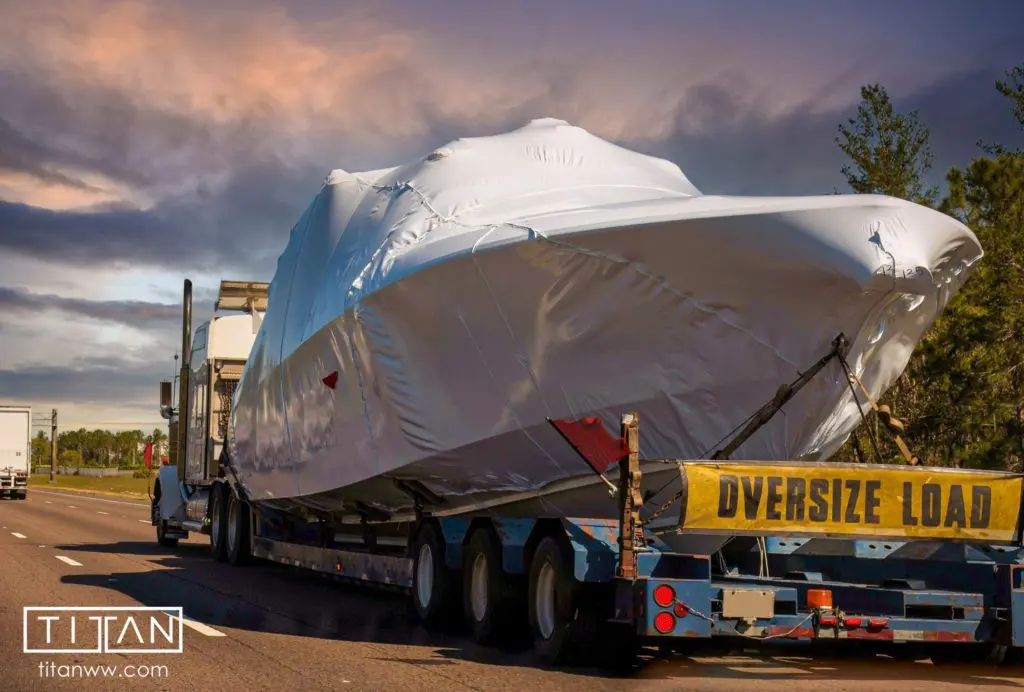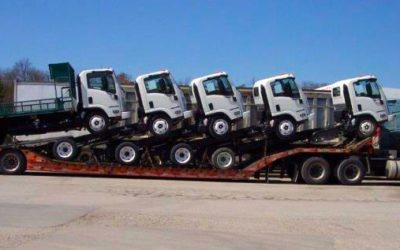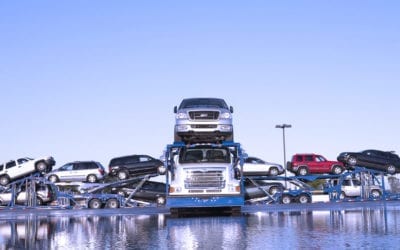Oversize Boat Transport: How It’s Done and FAQs
Need an oversize boat transport service? Read on for more information.
Being able to travel across beautiful waters on a whim, or having a romantic evening boat date — many people want this. We certainly do.
But, boat transport is a bit less dreamy. Professional boat haulers will often need to get involved to safely and effectively transport your boats. This includes both legal-sized boats and those that are considered oversized or even a superload.
Today, we’ll be covering how to classify your boat, how oversized and regular boat transports are done, and frequently asked questions + answers.
Classifying Your Boat
Like with regular loads, boats will come down to 3 primary categories: legal, oversize, and superload.
So, what’s the difference between the 3?
Legal Boats
Legal size boats are those that are no wider than 8.5 feet and less than 12 feet tall. Think typical smaller weekend getaway family boats. Like the name suggests, these boats are legal to be towed through most states.
There is a bit of leeway in states like North Carolina, which allows boats that are 10 feet to still be classified as legal. Other states allow boats to be as tall as 13.5 feet without needing additional permits. On the opposite end, certain states are also more strict. These states include New York, New Jersey, and Hawaii where the maximum width is only 8 feet.
Oversize Boats
Oversize boats are those that are typically wider than 8.5 feet and 12 feet tall. For these boats, think of yachts, sailboats, or even houseboats. Oversize boats require specialized permits and also additional steps to actually prepare the vessel to be safely transported.
If your boat is oversized, you may want to work with a company that’s specialized in boats and oversize transportation. This way, your boat will be in the most safe hands.
Superload Boats
Superload boats are the next tier up from oversize. These boats are more than 16 feet wide and 16 feet tall. Only a few boats will ever be big enough to be classified as a superload boat. There will be more regulations, permits, and setups necessary for superload boats. We won’t be discussing superload boats after this small section because they are not really relevant to most people.
Difference Between Boat and Regular Cargo Transport
For the most part, hauling oversize boats is regarded the same from state to state. The same permits are required and the same insurance policies will be needed to haul a boat and cargo. But, there are some key differences to consider.
Boats are designed to float in water — not meant to be on land. To mimic the even support that water provides across the hull of the boat, boat hulls will need to be supported manually across several points.
Boat decks and cockpits also come with accessories that need to be detached. If accessories cannot be detached, the next best step is to secure and protect accessories from damage. Accessories that should be reviewed include chairs, cushions, antennas, electronic tools, and decorative pieces.
One procedure completely unique to boats is the additional presence of zebra mussel inspections. Zebra mussels are an invasive species that is becoming a menace to North American lakes. As such, these inspections are normal when transporting boats.
How Regular and Oversize Boat Transport Happens
For regular boats, a basic flatbed trailer is often enough. But, for oversize boats, there’s a big emphasis on the dimensions themselves. For instance, taller boats are going to require a lowboy trailer. Some high-performance speed boats may need to be tilted on their side inside a standard box trailer to prevent damage.
In terms of boat hauling, it’s a very specific specialization. Businesses will need to utilize special tools to get your boat up and down trailers without damaging the boat. There are also specialized trailers designed to be extended into the water so a boat can be driven onto the ramp.
Frequently Asked Questions
How much does it cost to transport an oversize boat?
All companies operate differently but here’s what we can say is the general cost. The average cost to transport an oversize boat will range between $1 and $3 per mile. Shorter trips and smaller boats cost less, longer trips and bigger boats cost more. An oversize boat transport requires more permits and special procedures (e.g. escort surveys, route surveys, etc.), the price will generally go up. The price of fuel is also an influencing factor in transport prices.
Transporting on land vs port to port?
Cruising from port to port seems simple enough, but it’s actually not the most effective use of your money or time. On average, transporting a boat is around $2 per mile while cruising from port to port is $3 per mile. But, that doesn’t even account for food, supplies, and expertise. These extra fees are already factored into transporting on land with a professional service.
Who’s responsible for obtaining permits?
A licensed transport company will handle all paperwork and interactions with a permitting agency. Of course, if you choose to transport your own boat (which we don’t advise) — obtaining permits will fall onto your shoulders.
Who’s responsible for preparing the boat and shipment?
Typically, the owner of the boat is responsible for preparing and removing accessories before shipment. They are also responsible for finding a company and/or appointing a driver for the actual transport.
Can a boat owner tow their boat through multiple states?
The answer is a yes, provided that all permits are obtained. That means with legal-sized boats — where no permits are required — the owner can load up their boat and go wherever they want.
For oversize boat transport services, owners can still tow their boat provided that the driver is licensed to operate and oversize permits are obtained. If the total weight of the vehicle and boat exceeds 26,000 pounds, additional IFTA and IRP permits are necessary.
All private boats will also need to stop for routine zebra mussel inspections.
How do weight permits work?
Two different weight classifications require permits. As mentioned above, total weight (vehicle + boat) above 26,000 pounds requires IFTA and IRP permits.
There are also axle weight limits that need to be met. Even if the total weight of the vehicle and boat is less than 26,000 pounds — axle weight limits may apply. This is because certain boats can not be placed on a trailer evenly, putting more pressure on some axles over others.
Are there any special considerations for long-distance boat transports?
Long-distance oversize boat transport has their own set of challenges. The most important considerations are the tires and axles. Boat trailers are usually designed for relatively short hauls, with tires and axles that don’t do well with constant stress. Long distances at interstate highway speeds may overheat or cause complete tire and/or axle damage.
Before any trip, it is important to assess tires and bearings for quality. If quality is not met, the best practice is to replace them with new parts. You’ll also want to keep plenty of spares with you during the trip.
When beginning a trip, it is a good idea to stop after 30 to 45 minutes of highway driving. Safely pull over and check the wheels and axles for excess heat. If there is excess heat, you’ll want to periodically check the tires and axles throughout your trip.
How to prevent snap-on boat covers from unsnapping?
Sometimes, fast highway speeds can cause snap-on boat covers to become loose and unsnap. A special cover designed for highway speeds isn’t necessary, but it’s a great tool to keep boats protected from debris and the elements. These special covers have straps that grip around the hull and stay steady.
Special covers are important because regular snap-on ones might fall off. Besides your boat being damaged afterward, the cover may make you liable to damages on the road if the cover hits something or someone.
How does boat transport insurance work?
Besides truck and trailer insurance, most oversize boat transport haulers will have cargo insurance that covers losses due to carrier negligence. If the boat is damaged by another vehicle outside of the operator’s control, cargo insurance won’t be able to cover anything. Instead, damage to the boat will be covered by your boat insurance (if you have it) or the other driver’s insurance.
Boats are likely valued at thousands — if not millions of dollars — and you should update and double-check your policies for the vehicle, boat, and liability insurances.
For more information on boat transport, click here.




